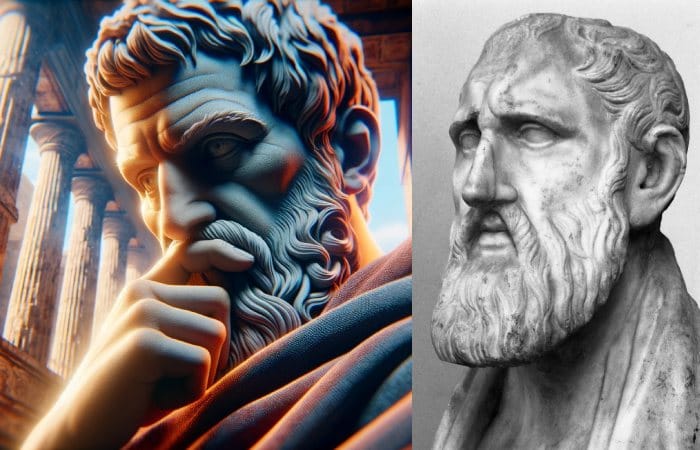
Blog
Xenon (Zenon)

In the history of philosophy, the name Xenon (Zeno) is remembered as one of the prominent and influential figures. Not only was he the founder of the Stoic school, but his ideas also had a profound impact on philosophical and ethical thinking in later periods. Xenon emphasized virtue, living in accordance with nature, and accepting fate, establishing principles that are still relevant in the modern world. This text will explore Xenon’s life and thoughts and analyze the role he played in the formation of Stoic philosophy.
فهرست عناوین
TogglePhilosophical Biography of Xenon
The philosophy that Xenon founded is now known as “Stoicism.” This philosophy examines how to achieve a happy and meaningful life. Xenon emphasized that many aspects of life, such as place of birth and skin color, are beyond our control and are, in a sense, imposed on us. However, Stoicism teaches us how to achieve happiness and success despite these limitations and how to find the right ways to live. This philosophy provides us with methods to handle the issues that affect our lives. Although we do not play a role in creating these issues, we can take responsibility for managing them and steer our lives toward the direction we desire. Xenon, the founder of Stoic philosophy, who lived around 300 BCE, lost his belongings in a tragic incident, many kilometers away from where he lived. This experience might have led anyone to despair and hopelessness. However, Xenon took a valuable lesson from this failure and, using it, developed the fundamental principles of Stoic philosophy. After this incident, he sought refuge in Athens, the center of philosophy at the time. In Athens, he studied and researched scientific and philosophical subjects. Xenon was deeply influenced by the ideas of Socrates and sought to understand his thoughts more profoundly. This admiration for Socrates led him to consider himself one of his disciples and benefit from his teachings. Xenon’s acquaintance with Socratic theories and his interactions with other philosophical masters made him one of the leading philosophers of his time.

A Look at the Philosophy and Teachings of the Stoics
In general, Zeno demonstrated how one can use the challenges and problems of life as an opportunity for growth and self-improvement. Gradually, Zeno established a new philosophical school under the name of “Stoicism,” which had a profound impact on the history of philosophy and human thought. This school emphasized principles such as reason, virtue, and living in accordance with nature, and is considered one of the most important philosophical schools of the ancient world.
In Stoic philosophy, particular emphasis is placed on human endurance and patience, with these moral foundations being regarded as essential principles. This school gradually had a deep influence on various generations of scholars and even on political realms worldwide, and its effects are still evident today.
Stoicism refers to the “stoa,” the covered portico where Zeno and his followers engaged in philosophical discussions. For this reason, the followers of this philosophy became known as Stoics. Those who follow this philosophy seek to avoid extreme emotions and fleeting passions. In fact, impulsive emotional reactions are seen as a sign of human immaturity, and followers of Stoicism strive to avoid such outbursts.
Suggested article: Eckhart Tolle
Introduction to Stoicism and Logos
The most important principle in Stoic philosophy is thought, rather than merely behavior. Stoicism believes that everything around us is shaped by a chain and network of connections, and each of these parts is interconnected. This comprehensive view helps us to gain a deeper understanding of the world and our place within it.
This worldview states that there is a logical structure to the universe, and this reasoning leads to the important principle that all phenomena in the world are influenced by a logical structure. The Stoics called this logical structure Logos. According to the principles of Zeno’s philosophy, by adopting a logical approach, we can transform situations beyond our control into favorable conditions.
The Stoics, as followers of this philosophy, have a particular outlook on life. Instead of an idealistic approach and imagining how everything should be, they attempt to accept the world as it is. These philosophers focus on four fundamental principles to build the soul and inner self. In other words, this philosophy places the foundation of human development on the four sides of a square, using these four pillars to enhance character and personal growth.
Wisdom and Leadership
Wisdom, as the ability to manage complex situations through logical and rational thinking, is defined alongside inner peace. This type of wisdom not only enables an individual to guide others, but also allows them to act based on their own internal logic, distancing themselves from emotional influences.
Moderation
One of the fundamental principles of this philosophy is moderation. A person must have the ability to restrain themselves and control their desires, always seeking balance. Moderation helps an individual avoid extremes and achieve equilibrium in all aspects of their life.
Justice and Fairness
The third pillar of this philosophy is justice and fairness. In social interactions, upholding fairness and justice in one’s behavior towards others and oneself is essential. When someone makes a mistake, they should approach correction with fairness and care, avoiding unjust judgments.
Inner Courage
The fourth principle of this philosophy is inner courage. A person must have the courage to stand firm in their beliefs and thoughts in all situations. This courage should be framed within the boundaries of moderation and fairness, and always accompanied by wisdom and logic.
Further reading: Courage

Application of Zeno’s Philosophy
Zeno’s philosophy, as a practical school of thought, helps individuals face the daily challenges of life and provides solutions to address them. These principles form the foundation of a human-centered philosophy that can serve as guidance for living a better, more balanced life in today’s complex world.
One of the fundamental tenets of Stoic philosophy is that it does not promote passivity or withdrawal from life. One of the famous Roman emperors, Marcus Aurelius, was able to rule the Roman Empire and inspire his people through the Stoic philosophy.
This philosophy has also had wide applications in contemporary times and even influenced Nelson Mandela. Relying on Stoic principles, Mandela was able to endure nearly 30 years in prison. Stoicism taught him that while the conditions of his life might not be under his control, he could still make the best of what he had.
Even though he was imprisoned, he was able to manage his circumstances in a way that supported his personal growth and development. This is the fundamental principle of Stoic philosophy that gave Mandela strength. He believed that past injustices should not cause bitterness or resentment, but instead, justice and kindness, guided by reason and logic, should be promoted in society.
Overall, Stoic philosophy teaches us that despite challenges and limitations, we can continue with a positive and constructive outlook on life, focusing on human values. This philosophy asserts that our suffering is not caused by the events of life, but by our judgments of those events. When we judge our experiences, we prepare ourselves to endure suffering. This concept is recognized in psychology as “adaptive self-help movement.”
Some individuals struggle with self-destructive patterns that negatively affect their quality of life and focus on their shortcomings and failures. In this context, we can observe the concept of “meaning therapy” within this philosophy. We are capable of steering our lives in a meaningful direction by controlling our will. When we learn to master our will, we can fill our lives with meaning and purpose.
برای مشاوره رایگان و رزرو وقت (یا اگر تماس گرفتید و قادر به پاسخگویی نبودیم) شماره تماس خود را وارد کنید. ما به زودی با شما تماس می گیریم!



